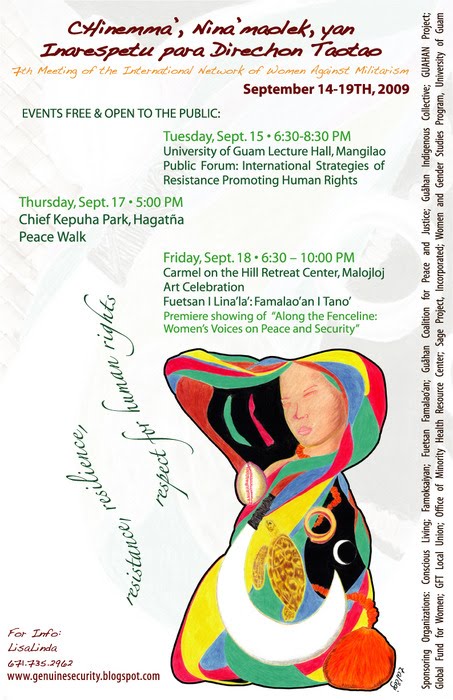Hawai'i Delegation Report Back from the 8th Meeting of the International Network of Women Against Militarism

WOMEN’S VOICES WOMEN SPEAK
C/O HAWAI‘I PEACE & JUSTICE
2426 O‘AHU AVENUE
HONOLULU HI 96822
WVWS808.BLOGSPOT.COM
FOR IMMEDIATE RELEASE May 21, 2012
Contact: Terri Keko‘olani 808-227-1621
Eri Oura 808-542-0348 eriola@gmail.com
Hawai‘i Women Share Experiences from Puerto Rico (Honolulu, O‘ahu). Four Hawai‘i women returned home recently after meeting with other members of the International Women’s Network Against Militarism (IWNAM) at the organization’s 8th annual meeting in Puerto Rico. They will share their experiences with the community Friday evening, June 1, 6:00 PM at the Church of the Crossroads in Honolulu.
The International Women’s Network Against Militarism (IWNAM) was formed in 1997 when forty women activists, policy-makers, teachers, and students gathered in Okinawa to strategize about the negative effects of the US military on their respective communities. The network—a collaboration among women active in their communities and who share the mission to promote, model and protect genuine security—includes women from the Philippines, South Korea, Okinawa, Japan, Guam, the continental United States, Puerto Rico and Hawai‘i.
“With the increasing militarism in so many of our communities, the opportunity to stand in solidarity with others who face issues similar to ours here in the islands,” said long time activist Terri Keko‘olani, “helps us to put our work into perspective.”
In addition to meeting around organization and strategic planning for the near future, the attendees participated in excursions to several storied places of Puerto Rico, such as El Yunqué Forest and a healing labyrinth in the mountainside village of Barranquitas. They participated in a protest against the building of a natural gas line in the city, met with survivors of domestic violence, former political prisoners, various women’s groups for peace, and others leading their communities in providing health screenings and services.
“Puerto Rico and Hawai‘i have much in common, as island economies that are dependent on importing basic necessities and vulnerable to unsustainable development and military interest,” Elise Davis, a public health educator, was particularly struck by the health concerns brought up by communities that experienced extensive military weapons testing. “Vieques has a 27% higher rate of cancer than mainland Puerto Rico, and no one can say with certainty that it is not related to the weapons testing.”
Communities, such as Ceiba, introduced them to the struggles to reclaim and reuse land no longer being used by the U.S. military. “There are so many similarities between Vieques and Kaho‘olawe,” shares Kim Ku‘ulei Birnie, a member of Protect Kaho‘olawe ‘Ohana. “They have Ceiba, Culebra and Vieques; we have Kaho‘olawe, Mākua and Pōhakuloa. We have so much to share with one another.”
The group also made presentations on the status of militarism in their respective countries, held at the University of Puerto Rico in San Juan, and at the museum on Vieques.
“There’s a strong partnership between the local communities and the university among the network in Puerto Rico. We met Puerto Ricos most involved and passionate activists and scholars who believe in the right to self-determination and actively resist further Americanization of their people and lands,” explained Eri Oura. “We were even greeted by the mayors of Barranquitas and Vieques.”
Terri Keko‘olani, Eri Oura, Elise Davis and Kim Ku‘ulei Birnie will share their impressions on Friday, June 1st, from 6:00-8:00 PM at the Church of the Crossroads in Honolulu, 1212 University Avenue.
This is a pre-event to the Umematsu & Yasu Watada Lecture Series on Peace, Social Justice & the Environment. The public is invited.
Women’s Voices Women Speak is a group of Hawai‘i women who organize around Kanaka Maoli sovereignty and demilitarization in Hawai‘i from women’s perspectives.
Women for Genuine Security is the U.S.-based partner in the International Women’s Network Against Militarism.
www.genuinesecurity.org
# PAU #
Media documents can be downloaded here: https://docs.google.com/file/d/0B-K0TmHJlFSUU19WaGk2WUZzeWM/edit







